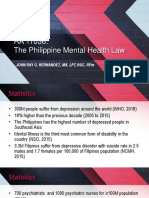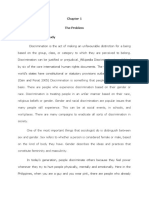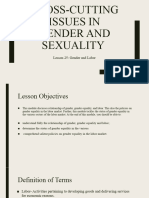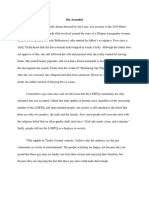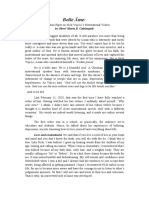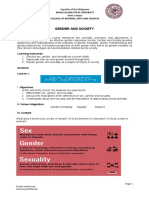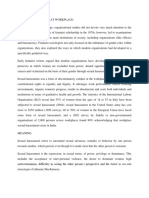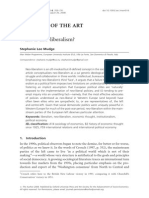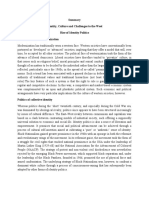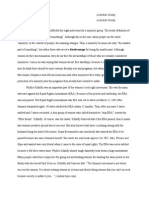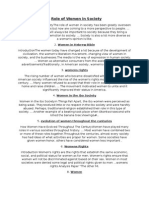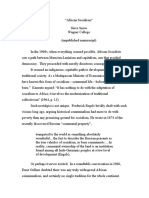Leigh Jhan Ochoa Bsais - 2b Gensoc Midterm Exam
Leigh Jhan Ochoa Bsais - 2b Gensoc Midterm Exam
Uploaded by
Leigh Jhan OchoaCopyright:
Available Formats
Leigh Jhan Ochoa Bsais - 2b Gensoc Midterm Exam
Leigh Jhan Ochoa Bsais - 2b Gensoc Midterm Exam
Uploaded by
Leigh Jhan OchoaCopyright
Available Formats
Share this document
Did you find this document useful?
Is this content inappropriate?
Copyright:
Available Formats
Leigh Jhan Ochoa Bsais - 2b Gensoc Midterm Exam
Leigh Jhan Ochoa Bsais - 2b Gensoc Midterm Exam
Uploaded by
Leigh Jhan OchoaCopyright:
Available Formats
Leigh Jhan Ochoa
BSAIS – 2B
Midterm Examination
Gender and Society
What is patriarchy?
Patriarchy is a social system in which men have primary power and predominate in roles such as political leadership,
moral authority, social privilege, and property control. Some patriarchal societies are also patrilineal, which means that
property and title are passed down through the male lineage. Patriarchy is connected with a set of concepts, a
patriarchal ideology, which serves to explain and justify this dominance and links it to the underlying natural inequalities
between men and women. Sociologists view patriarchy as a social construct rather than an inherent difference between
the sexes, and they focus on how gender males in a culture effect power differentials between men and women.
“Patriarchy is an unnatural state." Many reasons have contributed to women's inequity and hierarchical administrations
controlled by men throughout history. Because there were many patriarchal societies throughout history, legal
inequities, traditions, and religions were imposed on women based on the idea that women are biologically weaker than
men physically and mentally.
Patriarchy is a social structure in which males are the dominant authority figures in families and society. Due to
patriarchy, females have been disadvantaged in many sectors of life including job, family life, crime, health, education
and media. This has prompted sociologists to investigate the reasons of gender disparity. Feminists would agree that
patriarchy is the primary source of gender inequality; nevertheless, there are distinct strands of feminism, and these
strands have diverse perspectives. Other theories, such as functionalists and postmodernists, have various perspectives
on the reasons of gender disparity. There is much evidence to show that things have changed to benefit women, for
example, domestic violence is now taken seriously by the police, men are increasingly taking on the primary care role,
labor laws make gender discrimination illegal, rape within the marriage is now a crime and women are also doing better
in education than men.
Patriarchy, which assumes male supremacy over females, shamelessly maintains women's dependency on and
subordination to man in all aspects of life. As a result, all power and authority within the family, community, and state
remain exclusively in the hands of males. As a result of patriarchy, women were denied their legal rights and
possibilities. Patriarchal ideals limit women's mobility and deny their independence over themselves and their
possessions. Regardless matter the amount of dominance, the general concepts remain the same, since males are in
power. This control's nature may vary. So, in order to fight for women's development in a systematic manner, it is vital
to comprehend the system that maintains women controlled and submissive, as well as to uncover its workings.
Patriarchy does not exist only in men. The force of patriarchy is the water that we all swim in and we’re the fish. Women
can be just a patriarchal as men by holding those same types of values and biases.
You might also like
- Module 4 ActivitiesDocument5 pagesModule 4 ActivitiesJasmine Z. SalicNo ratings yet
- Second Sex - Reading BooksDocument31 pagesSecond Sex - Reading BooksJohn Carl B. Aparicio0% (1)
- Office of The President Republic of The Philippines Commission On Higher EducationDocument33 pagesOffice of The President Republic of The Philippines Commission On Higher EducationCarolNo ratings yet
- Political-Legal Perspective of The Philippine GAD ProgramDocument46 pagesPolitical-Legal Perspective of The Philippine GAD ProgramJohn Rey MercurioNo ratings yet
- Module 10A: Behavioral Analysis by Skinner: C-Psym213 Theories of PersonalityDocument7 pagesModule 10A: Behavioral Analysis by Skinner: C-Psym213 Theories of PersonalityLiam Jacque LapuzNo ratings yet
- The Filipinos in Rizal's TimeDocument3 pagesThe Filipinos in Rizal's TimeRose Marie VicenteNo ratings yet
- Sikolohiyang PilipinoDocument16 pagesSikolohiyang PilipinoNeth AquinoNo ratings yet
- Mental Health LawDocument26 pagesMental Health LawJOHN RAY HERNANDEZNo ratings yet
- Gender and Society Chapter 2Document36 pagesGender and Society Chapter 2Jasmine BautistaNo ratings yet
- The Physical and Sexual SelfDocument14 pagesThe Physical and Sexual SelfIssa JonesNo ratings yet
- Lesson 3 TAXATIONDocument14 pagesLesson 3 TAXATIONMarked BrassNo ratings yet
- Essay On Bangsamoro Youth, Bangsamoro's FutureDocument3 pagesEssay On Bangsamoro Youth, Bangsamoro's Futurealican karimNo ratings yet
- Thereserve Officers Training Corps (Rotc)Document7 pagesThereserve Officers Training Corps (Rotc)Christin Schlitt100% (1)
- Constituents of Human ActsDocument5 pagesConstituents of Human ActsArianne Joy SalvadorNo ratings yet
- Prevalence of Gender DiscriminationDocument8 pagesPrevalence of Gender Discriminationalphashane FloresNo ratings yet
- Ethics A Philosophy of ActionDocument2 pagesEthics A Philosophy of ActionElieNo ratings yet
- Ra 1425Document47 pagesRa 1425Edward NewgateNo ratings yet
- STS Module 7Document3 pagesSTS Module 7Angel Justine BernardoNo ratings yet
- Psy09 Chapter 3 ActivitiesDocument7 pagesPsy09 Chapter 3 ActivitiesJuliet Anne Buangin AloNo ratings yet
- An Exploratory Study On The Racial Perceptions of The Senior High School Students of San Beda UniversityDocument59 pagesAn Exploratory Study On The Racial Perceptions of The Senior High School Students of San Beda UniversityDiazmean SoteloNo ratings yet
- Women and EducationDocument22 pagesWomen and EducationYDELVAN LLANONo ratings yet
- Gender and LaborDocument11 pagesGender and LaborGrace SumayangNo ratings yet
- Ilovino, Richard David M. (Activity#3)Document4 pagesIlovino, Richard David M. (Activity#3)Richard David IlovinoNo ratings yet
- GEC8 - Human Acts Vs Acts of ManDocument38 pagesGEC8 - Human Acts Vs Acts of ManNica RomeroNo ratings yet
- MUMBAKI1Document4 pagesMUMBAKI1Jerson Atsiv50% (2)
- Die, Beautiful (REVIEW)Document4 pagesDie, Beautiful (REVIEW)Ma. Yvone DavidNo ratings yet
- Lesson GUide For RizalDocument13 pagesLesson GUide For RizalBai NiloNo ratings yet
- Ethics-1 3Document20 pagesEthics-1 3Roriel Hernandez BenamirNo ratings yet
- GPICDocument23 pagesGPICRuss AnneNo ratings yet
- Village of The WatermillsDocument1 pageVillage of The Watermillssnay axieNo ratings yet
- Act 1Document2 pagesAct 1joash suazoNo ratings yet
- Ailene F. Quinto BSMA-lllDocument3 pagesAilene F. Quinto BSMA-llljennie kimNo ratings yet
- Cultures and RationalitiesDocument5 pagesCultures and RationalitiesLYSA KARYLLE VILLANUEVANo ratings yet
- The Belle ȂmeDocument4 pagesThe Belle Ȃmesei gosaNo ratings yet
- College of CriminologyDocument14 pagesCollege of CriminologyDatulna Benito Mamaluba Jr.No ratings yet
- Module 8Document4 pagesModule 8AllanCuartaNo ratings yet
- Sikolohiyang Pilipino: Knowing Yourself, Knowing OthersDocument2 pagesSikolohiyang Pilipino: Knowing Yourself, Knowing OthersGia Santos EvangelistaNo ratings yet
- Reflection in Ra 9262Document2 pagesReflection in Ra 9262ere chanNo ratings yet
- CH4Document4 pagesCH4Joshua SaguilNo ratings yet
- Historical, Cultural, and LegalEthical ConsiderationsDocument25 pagesHistorical, Cultural, and LegalEthical ConsiderationsMHERYLL MAGBAYAO100% (1)
- GEC 13 Module Prelim PDFDocument64 pagesGEC 13 Module Prelim PDFhnnhnicole8No ratings yet
- III. A. Pre-Test: True or FalseDocument19 pagesIII. A. Pre-Test: True or FalseDonna Mhae RolloqueNo ratings yet
- Ethics Activity2Document7 pagesEthics Activity2Anna MutiaNo ratings yet
- Lesson 2Document7 pagesLesson 2John ClementeNo ratings yet
- Subject: Waiver: National Service Training ProgramDocument1 pageSubject: Waiver: National Service Training ProgramSean Philippe CabralNo ratings yet
- Librero, Nova Jhaen (Plagiarism 2)Document2 pagesLibrero, Nova Jhaen (Plagiarism 2)Uuhh OkehNo ratings yet
- REVIEWERDocument5 pagesREVIEWERneil gutierrezNo ratings yet
- Purposive Communication Preliminary DiscussionDocument10 pagesPurposive Communication Preliminary DiscussionKristal PabloNo ratings yet
- Activity (Week 4) Psychosocial Dimensions of SexualityDocument2 pagesActivity (Week 4) Psychosocial Dimensions of SexualityThamiah Izabell OdenaNo ratings yet
- 10 Ethical Theses of ConfuciusDocument1 page10 Ethical Theses of ConfuciusCarla Maxinne Santos100% (1)
- Gender & Society 3Document2 pagesGender & Society 3John RoasaNo ratings yet
- Tcwd111 ActivitiesDocument5 pagesTcwd111 ActivitiesRica Jhen BrionesNo ratings yet
- PH 104 Notes On Moral DeliberationDocument12 pagesPH 104 Notes On Moral Deliberationminchion0% (2)
- Preliminary Coverage ETHICS030 College of Arts and SciencesDocument12 pagesPreliminary Coverage ETHICS030 College of Arts and SciencesAngelyn SamandeNo ratings yet
- Gender and Society: Bohol Island State University College of Business, Arts and SciencesDocument10 pagesGender and Society: Bohol Island State University College of Business, Arts and SciencesMaria GraciasNo ratings yet
- TCW Cram Reviewer (FINALS)Document6 pagesTCW Cram Reviewer (FINALS)Allyssa DCNo ratings yet
- What Is History: E. Kent RogersDocument27 pagesWhat Is History: E. Kent RogersIrwin FajaritoNo ratings yet
- Module 1-6 - EthicsDocument34 pagesModule 1-6 - EthicsCaila PanerioNo ratings yet
- The Case for Masks: Science-Based Advice for Living During the Coronavirus PandemicFrom EverandThe Case for Masks: Science-Based Advice for Living During the Coronavirus PandemicNo ratings yet
- Patriarchy 101Document7 pagesPatriarchy 101karkiishana.07No ratings yet
- Sexual Harassment at WorkplaceDocument5 pagesSexual Harassment at WorkplaceIshanviNo ratings yet
- Walang Rape Sa Bontoc': Philippine Indigenous Communities Reaction PaperDocument1 pageWalang Rape Sa Bontoc': Philippine Indigenous Communities Reaction PaperLeigh Jhan OchoaNo ratings yet
- Ia Vol 1 Valix 20192020 Answer KeyDocument232 pagesIa Vol 1 Valix 20192020 Answer KeyLeigh Jhan OchoaNo ratings yet
- IndigenousDocument1 pageIndigenousLeigh Jhan OchoaNo ratings yet
- ReportDocument1 pageReportLeigh Jhan OchoaNo ratings yet
- GP Politics Essay QuestionsDocument2 pagesGP Politics Essay QuestionsThomas Lee100% (1)
- Liberal FascismDocument3 pagesLiberal FascismCésar Mejía100% (1)
- Kinda of FeminismDocument4 pagesKinda of FeminismDivij ummatNo ratings yet
- Errico Malatesta Anarchy PDFDocument2 pagesErrico Malatesta Anarchy PDFKeithNo ratings yet
- SWPPC - Assignment 2 - Hemsw20024 - Theories of Social JusticeDocument12 pagesSWPPC - Assignment 2 - Hemsw20024 - Theories of Social JusticeAparna VyasNo ratings yet
- Democracy VS DictatorshipDocument5 pagesDemocracy VS DictatorshipKholah Rizwan100% (1)
- Socialist FeminismDocument4 pagesSocialist Feminismindrajit100% (1)
- Organise!: Interview With An Anarchist DominatrixDocument6 pagesOrganise!: Interview With An Anarchist DominatrixBloomNo ratings yet
- Mudge, S. L. (2008) - What Is Neo-Liberalism. Socio-Economic Review, 6 (4), 703-731 PDFDocument30 pagesMudge, S. L. (2008) - What Is Neo-Liberalism. Socio-Economic Review, 6 (4), 703-731 PDFlcr89No ratings yet
- Ayn Rand LexiconDocument1 pageAyn Rand LexiconcamilorayoNo ratings yet
- Chris Cutrone, "Proletarian Dictatorship and State Capitalism"Document2 pagesChris Cutrone, "Proletarian Dictatorship and State Capitalism"ccutrone7053No ratings yet
- The Socialist Manifiesto Review by Kevin CarsonDocument8 pagesThe Socialist Manifiesto Review by Kevin CarsonDaniel CastilloNo ratings yet
- Karl MarxDocument11 pagesKarl Marxcyryll mangosingNo ratings yet
- G.A. Cohen - Is Socialism Inseperable From Common Ownership (1995) PDFDocument4 pagesG.A. Cohen - Is Socialism Inseperable From Common Ownership (1995) PDFMatheus GarciaNo ratings yet
- 1954 - PRC ConstitutionDocument1 page1954 - PRC ConstitutionDženan HakalovićNo ratings yet
- Identity, Culture and Challenges To The West Rise of Identity Politics Westernization As ModernizationDocument3 pagesIdentity, Culture and Challenges To The West Rise of Identity Politics Westernization As ModernizationIftekhar AhmedNo ratings yet
- Dominant Approaches And: Ideas in The Social SciencesDocument15 pagesDominant Approaches And: Ideas in The Social SciencesSir Bench100% (1)
- Gen 001 Sas 19Document2 pagesGen 001 Sas 19BERON CRYSTAL JYCEL L.No ratings yet
- Major Political IdeologiesDocument12 pagesMajor Political IdeologiestheakjNo ratings yet
- Feminism EssayDocument4 pagesFeminism Essayjed0% (1)
- Second Wave FeminismDocument13 pagesSecond Wave FeminismNiño Jhay GianNo ratings yet
- Women Place in SocietyDocument3 pagesWomen Place in SocietySohail ChaudhryNo ratings yet
- Kuehnelt-Leddihn Liberalism in AmericaDocument7 pagesKuehnelt-Leddihn Liberalism in Americatinman2009100% (1)
- Feminism EssayDocument3 pagesFeminism EssayLea WatkinsChowNo ratings yet
- Snow, African SocialismDocument5 pagesSnow, African SocialismSteve SnowNo ratings yet
- Communist Manifesto Marx and Engels PDFDocument2 pagesCommunist Manifesto Marx and Engels PDFJoeNo ratings yet
- CommunismDocument11 pagesCommunismapi-408883036No ratings yet
- Equality Liberal Libertarian and SocialismDocument8 pagesEquality Liberal Libertarian and Socialismtariq ahmad sheikhNo ratings yet
- Hegel and MarxDocument17 pagesHegel and MarxLuis Eduardo de Leon100% (1)







